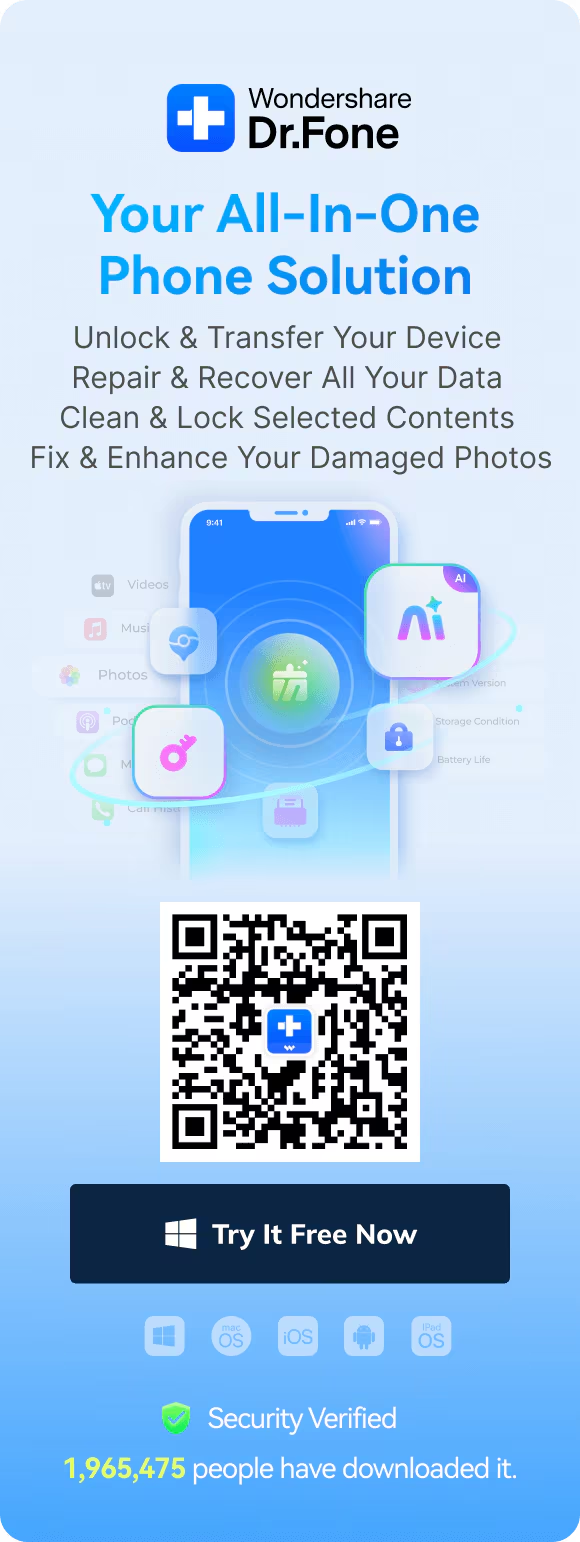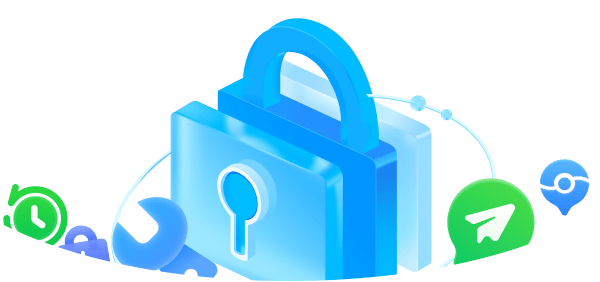Have you ever discussed a product with a friend, only to see ads of the same product seconds later on your phone? This strange coincidence has many people wondering: Is my phone listening to me for ads? While smartphones do not actively listen to your conversations, they gather a large quantity of behavioral data to provide highly targeted advertisements. Apps often seek microphone access without a valid reason, potentially exposing your personal information to exploitation.
In this article, we'll examine whether your phone is listening, the mechanics behind targeted adverts, and what you can do to protect yourself. Whether you use an iPhone or an Android, knowing how to stop your phone listening to you is the first step in regaining control of your digital footprint.
In this article
Part 1. Is Your Phone Really Listening?
Privacy concerns about smartphones have developed dramatically as technology has become increasingly incorporated into everyday life. Apps, voice assistants, and internet platforms may gather data about your habits, likes, and preferences without your knowledge or permission.
When your phone knows too much, it's easy to think it's listening. Though possible, the fact is more complicated. Smartphone behavior myths vs. reality.
1.1 Myth v.s. Reality
Your phone doesn't secretly record your chats, despite widespread perception. Official comments from Apple and Google claim their gadgets and applications follow stringent privacy requirements. They disallow targeted advertising eavesdropping. The giant itself, Apple, has clearly denied that the iPhones are not listening to users without consent. Also, Apple said that the Siri data has never been sold for marketing campaigns.
Instead of "listening", your phone may collect data using advanced methods. Companies forecast your interests and provide advertising using information, browser patterns, search queries, and location monitoring. In a group chat, an ad for a product may appear because the platform's algorithm picked up terms in a text or your online behavior, not because your phone is listening.
1.2 Examples of Data Collection
Apps often seek microphone access. Many use these characteristics for legitimate reasons, while others collect data. Some applications sought unneeded microphone access and utilized the data for targeted advertising. Popular applications like social networking and e-commerce platforms have been accused of gathering audio-triggered data for user experience enhancement.
Apps may access contacts, location, and browser history with permission. Using location services may explain why a restaurant suggestion appears after you pass it. This gives the impression your phone is "always listening."

1.3 Why It Feels Like Your Phone Listens
Targeted advertising algorithms cause phone listening. These technologies evaluate your search and purchase history to offer adverts that match your interests.
Companies collect behavioral data from applications, websites, and third-party cookies. This advanced profiling makes your gadget seem to know your every move. The result? It's tempting to think your phone overheard your chats when you see adverts suited to your behavior.
Understanding these practices proves direct listening of your phones. So, if you’re also wondering how do I stop my phone from listening to me, then start protecting your privacy and reducing data collecting using the methods below.
Part 2. How to Stop Your Phone from Listening
If the concept of your phone "listening" worries you, protect your privacy. By evaluating settings and permissions, you may greatly limit data abuse. Here's a complete plan to take back control.
2.1 General Privacy Best Practices
Check your phone's permissions. Many needless applications require microphone access. Check your phone's settings to see which applications may utilize the microphone and deactivate those that don't.
You must also upgrade your software. OS upgrades sometimes contain security fixes to prevent hackers and harmful programs from exploiting vulnerabilities. Ignoring updates might put your phone in danger. Also, only download programs from Google Play or the Apple App Store to avoid malware.
2.2 Steps for Specific Operating Systems
- For iPhone (iOS):
- Check ""Settings > Privacy & Security > Microphone"" to see applications with microphone access.
- Turn off unnecessary app access.
- Go to ""Settings > Privacy & Security > Tracking > Allow Apps to Request to Tracking"" to deactivate app tracking. This restricts app data sharing with advertising.
- If not often used, click ""Settings > Siri & Search"" and disable ""Listen for 'Hey Siri.'""
- Disable ""Allow Siri When Locked"" to avoid accidental activations.
- For Android:
Disable microphone access for apps:

Use App Tracking Transparency:

Adjust Siri/Dictation settings:

Update microphone permissions:
- Open "Settings > Privacy > Permission Manager > Microphone" to see applications with microphone access.

- Deny access to non-essential applications.
Disable "Hey Google" for voice assistants:
- Launch the Google app, choose "Settings > Google Assistant > Voice Match," and deactivate "Hey Google."

2.3 Advanced Measures
- Disable Siri, Alexa, and Google Assistant while not in use for increased security. Although useful, these functionalities need continual microphone access, which might threaten privacy.
- Advanced measures include app settings management. Many social media sites capture too much data. Access their privacy settings to restrict microphone and other sensitive elements.
- Finally, explore third-party privacy tools. Dr.Fone App locks crucial applications and manages permissions to increase security.
These techniques and proactive practices may prohibit your phone from listening and greatly enhance digital privacy. These steps let you manage your data and prevent abuse.
Part 3. How to Keep Your Phone from Listening in the Future
Maintaining privacy requires continuous monitoring and proactive steps. Here's an explanation of how to protect your personal information and keep your phone from "listening" in the future.
3.1 Preventative Measures
To protect your privacy, begin by being careful about app permissions and downloads:
Review App Permissions:
- Before installing an app, review the permissions it demands.
- Allowing microphone access to applications that do not need it is not recommended.
| Permission | Examples of Relevant Apps | Irrelevant Apps |
| Microphone | Voice assistants, video calling | Weather, calculators, third-party apps |
| Location | Maps, delivery apps | Gaming apps, other third-party apps |
Avoid Untrusted Sources:
- Only download software from official shops like Google Play or Apple App Store.
- Third-party app shops may house harmful programs that jeopardize your privacy.
3.2 Alternative Privacy-Focused Tools
For a more privacy-focused experience, try utilizing tools and gadgets intended to secure your data:
Privacy-Focused Apps and Devices:
- Signal allows encrypted calls and messages.
- DuckDuckGo offers private browsing that does not trace your searches.
- ProtonMail provides secure email communication.
- De-Googled phones do not rely on Google services, hence decreasing data monitoring.
3.3 Educate Yourself on Privacy Updates
Staying up to speed with privacy rules and system changes is critical.
Stay informed:
- Follow Android and iOS-related blogs and announcements.
- Understand new features such as App Tracking Transparency and Privacy Dashboards.
Leverage Privacy Settings:
- On iOS, tools such as Privacy Report monitor data access.
- Check the Permission Manager regularly on Android to identify any strange app activity.
By taking these measures and using privacy technologies, you may create a safer digital environment where your phone respects your boundaries and personal information.
Part 4. Bonus: Strengthen Privacy with Dr.Fone App - App Lock (iOS)
A. Introduction to Dr.Fone App - App Lock:
The Dr.Fone App - App Lock (iOS) improves iPhone privacy. In today's digital era, ensuring the security of critical applications is more important, particularly given the threats of illegal access and data leakage. This program offers a powerful solution for securing private information inside applications, enabling users to limit access and protect their digital footprint efficiently.
Dr.Fone App - App Lock reduces privacy risks and possible "listening" problems by locking chat platforms, social media, and financial apps. This solution is great for anyone wishing to improve their security since it provides a simple and dependable approach to secure critical data on iOS devices.
B. Features of Dr.Fone App - App Lock
Dr.Fone App - App Lock stands out for its extensive app-locking features, which are intended to safeguard important applications and protect personal information. Here's a deeper look at its key features:
Dr.Fone App - App Lock (iOS)
Enhanced App Security: Lock/Hide Apps Based on Time and Location
- Lock apps to prevent accidental deletions or downloads.
- Hide apps from the home screen for enhanced privacy.
- Face ID/PIN code protection for secure access.
- Supports iOS 16 and above.
- Comprehensive App Locking or Hiding
- User-Friendly Interface
- Customization Options
- Smooth integration with iOS
The software lets users lock or conceal certain applications using Face ID or custom PIN code. Users can easily safeguard access to important programs, including social networking platforms, messaging apps, and banking tools.
The app's smart and user-friendly design makes privacy control simple. This makes setting up and modifying apps simple, especially for individuals unfamiliar with privacy tools.
Dr.Fone App - App Lock provides extensive choices for setting limits based on individual preferences. Users may establish locks depending on time, location, or individual device settings, creating a more customized and secure environment.
Designed particularly for iPhones, the app is compatible with the most recent iOS versions, ensuring a smooth user experience. This integration provides seamless functioning without affecting device performance.
C. How to Use Dr.Fone App - App Lock for Privacy:
Protecting your applications and critical data with the Dr.Fone App - App Lock (iOS) is simple. This program allows you to lock or hide applications according to precise settings, assuring complete privacy. Here are the steps to utilizing Dr.Fone App - App Lock:
01of 04Download and launch the App Lock Tool
Download Dr.Fone "App Lock" from the official website or the App Store. Open the app and then touch the blue "AI Tools Toolbox" at the bottom center of the screen. To access the settings, click the "Discover" tab and press the "App Lock" option.

02of 04Create and organize app groups
Tap "Please add a group first" to start a new app group. Rename the group to your chosen name (for example, "Work Apps"). Tap "Select apps" to pick the apps you wish to lock or hide on your iPhone. Confirm by clicking "Save."

01of 04Configure the Locked or Private Modes
On the Edit Group page, select:
- Locked Mode: Locks applications on the home screen.
- Private Mode: Apps are hidden from the home screen.

Tap the "Save" icon to activate the restrictions. Locked applications seem grayed out, while hidden apps disappear from the screen.
04of 04Restrict Zones or Time
- Restrict Zone: Create location-based limits by picking a center on the map and modifying the radius (200m-800m). Apps stay closed or hidden in this zone.

- Restrict Time: To automate constraints, provide start and finish hours and repeat days (for example, Monday through Friday).

Notes: You can tap the "Settings" icon in the upper right corner. Set up a "Face ID" or a "PIN " for additional protection. Only authorized users may use the App Lock feature.
D. Why Choose Dr.Fone App - App Lock
Dr.Fone App - App Lock is a reliable privacy solution for those who value control over their data. Here's what makes it stand out:
- Proven security: Created by a reputable business recognized for privacy technologies.
- Geographical and time-based restrictions: Apps may be locked or hidden depending on location or schedule.
- Comprehensive Protection: Use Face ID or PIN to protect applications.
- Customizable Features: Group applications with customizable settings.
Conclusion
While your phone may not actively listen to your conversations, the data it collects might give the sense of invasive targeting. Following the privacy suggestions in this article—such as controlling app permissions, deleting unneeded features, and maintaining up-to-date privacy updates—can greatly decrease the risk of data exploitation.
For those looking for further security, tools like Dr.Fone App - App Lock provide a simple but effective approach to secure crucial applications and information. Remember that your privacy is in your hands, and by taking these concrete measures, you can regain control and learn how to keep your phone from listening to you.




























Bhavya Kaushik
staff Editor
Generally rated4.5(105participated)